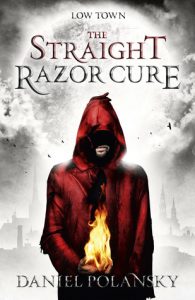The Straight Razor Cure by Daniel Polansky
 The Straight Razor Cure is less of a fantasy and more of a crime noir that just happens to be set in a secondary world. This is not a bad thing.
The Straight Razor Cure is less of a fantasy and more of a crime noir that just happens to be set in a secondary world. This is not a bad thing.
Polansky’s debut combines different elements of various genres: we have a former detective investigating the crimes of a sinister serial killer, underlying messages about class division, a grimdark setting, and a few aspects of traditional high fantasy, such as magic. It’s fresh and interesting, and an additional dark undertone is provided by the numerous parallels between Polansky’s fictional universe and our own world.
The world itself is fairly vivid and well-realised: the majority of Low Town is dirty and ugly – as are many of its inhabitants – and it is rife with moral and physical corruption. It’s full of drugs, murder, organised crime and bigotry, and the author effectively uses the first person narration of the main character to implicate the reader in various kinds of casual and normalised delinquency.
The protagonist is very much an anti-hero, the sort of character that is common in this sort of ‘low’ or ‘grimdark’ (or maybe just ‘grim’) fantasy. Warden is an ex-soldier and former investigator who has fallen on hard times due to an unspecified incident, which makes him somewhat enigmatic. He is a drug dealer; he has a tough exterior, and his morals are questionable at best. But his conscience (and more often the conscience of his best friend Adolphus) generally prods him into doing the right thing, even if he can’t help but break a few heads (and arms, and legs, and ribs, and necks) along the way.
On our way through the story we learn a few things about our protagonist’s history. This is very well done, as it’s not over-emphasised; rather, the author feeds us bits of backstory that are relevant to the plot, while withholding key information about Warden’s personal history for future novels. I must admit I’m curious to learn more about his early life with the Crane and about his time as a member of the ‘frost’, particularly since he doesn’t dwell overmuch on himself and his memories.
The plot was fairly even-paced for the most part, perhaps representing the initial lethargy of Warden, though there are enough moments of surprise and gruesomeness to keep the reader sufficiently intrigued. It picks up the pace marvellously towards the end, however, and the twist ending – although not entirely unexpected – is an exciting resolution to the story. Overall this is an impressive debut novel, and I’m looking forward to seeing more of Warden in future Low Town novels.
